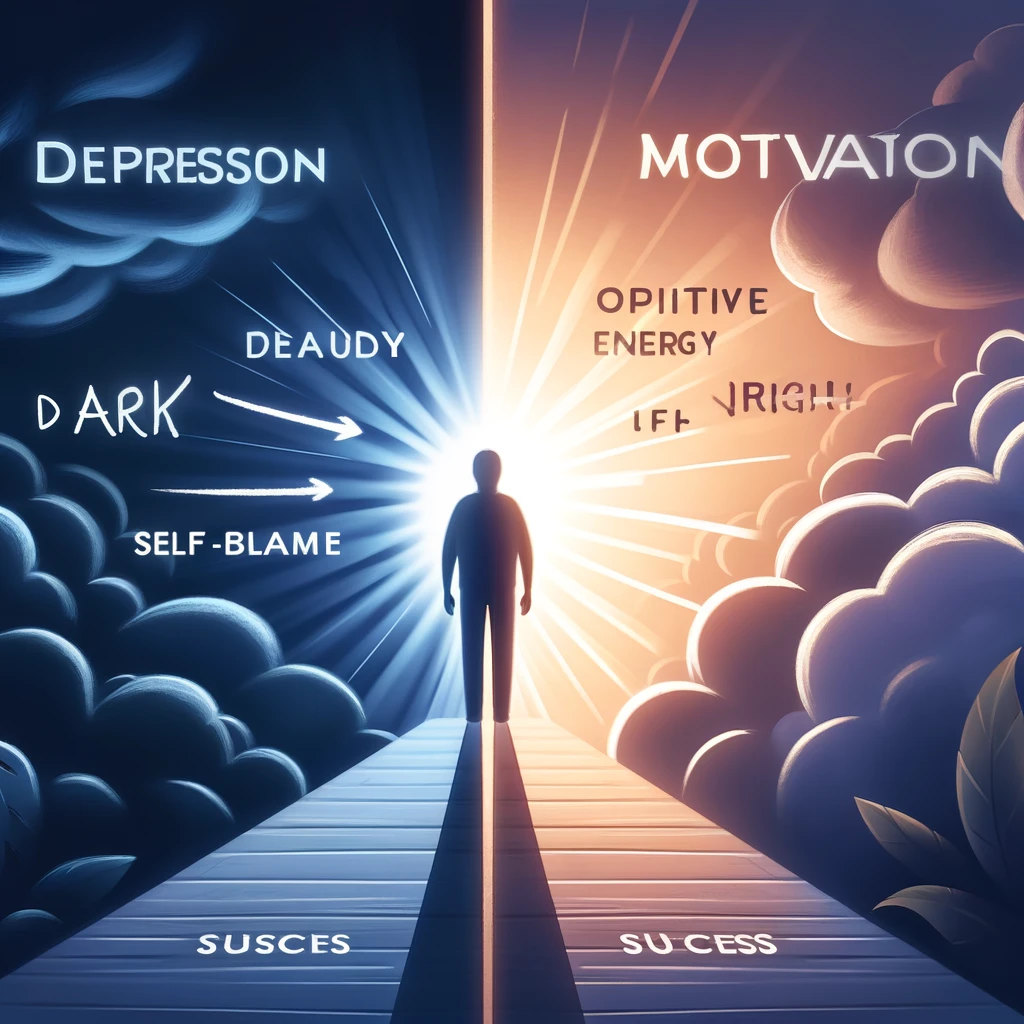Depression is one of the most challenging emotional states a person can experience. Often misunderstood as a mental health condition that only affects certain individuals, depression is, in fact, a widespread emotional experience. However, according to the Unified Theory of Emotions, depression and motivation are two sides of the same emotional spectrum. Where depression stems from self-blame, dissatisfaction, and a lack of purpose, motivation arises from self-acceptance, contentment, and a clear sense of direction. By shifting from self-blame to self-acceptance, individuals can break through the emotional barriers of depression and move toward sustained motivation.
Understanding Depression as an Emotional State
Depression, as defined by the Unified Theory of Emotions, is not just a chemical imbalance or a state of sadness. It is an emotional state rooted in self-blame and dissatisfaction with oneself. Individuals who are depressed often hold themselves to unrealistic expectations and then blame themselves when they fail to meet these expectations. This cycle of self-blame erodes their sense of purpose and creates an emotional disconnect from their goals.
The key to breaking free from depression lies in understanding that it is an emotional misalignment. People who are depressed are often stuck in a negative feedback loop where they feel unworthy, incapable, and disconnected from their true potential. This emotional dissonance makes it difficult to find the motivation needed to take action and pursue goals.
The Path to Motivation: From Self-Blame to Self-Acceptance
Moving from depression to motivation requires a fundamental shift in how individuals perceive themselves and their emotions. Here are key steps to help make this emotional transition:
- Acknowledge and Accept Emotions: The first step to breaking through depression is to acknowledge the emotions that are contributing to it. Many people try to suppress their feelings of self-blame or dissatisfaction, but this only deepens the emotional wound. Instead, individuals should confront these emotions head-on and accept them as part of their emotional journey.
- Challenge Unrealistic Expectations: Depression often arises from self-imposed, unrealistic expectations. Individuals set the bar too high for themselves and then feel like failures when they don’t meet these standards. By challenging these expectations and setting more realistic, achievable goals, people can begin to shift their emotional state from self-blame to self-acceptance.
- Set Small, Achievable Goals: Motivation thrives on small victories. By setting incremental, achievable goals, individuals can create a sense of progress and purpose. Each small goal achieved builds self-confidence and emotional alignment, gradually shifting the person’s emotional state from depression to motivation.
- Focus on Self-Acceptance: Motivation is deeply rooted in self-acceptance. Individuals who accept their flaws, acknowledge their progress, and embrace their journey are more likely to stay motivated in the long run. Self-acceptance reduces the emotional burden of perfectionism and self-blame, allowing individuals to feel more content with themselves and their efforts.
- Celebrate Progress: Motivation requires positive reinforcement. Every small achievement, no matter how minor, should be acknowledged and celebrated. By focusing on progress rather than perfection, individuals can build a sense of purpose and emotional alignment that fuels motivation.
Breaking Emotional Barriers in Personal Life
The emotional barriers created by depression are often deeply ingrained in a person’s self-perception and sense of worth. Breaking through these barriers requires patience, self-compassion, and consistent effort. Here’s how individuals can apply the steps above to overcome emotional challenges in personal life:
- Cultivate Emotional Awareness: Self-awareness is key to identifying the root causes of emotional distress. By paying attention to their thoughts, feelings, and triggers, individuals can better understand how their emotions are influencing their behavior and decisions.
- Reframe Negative Thoughts: Depression often distorts how individuals perceive themselves and their situations. By challenging negative thoughts and reframing them in a more positive or realistic light, individuals can shift their emotional state toward a more hopeful and motivated outlook.
- Seek Support: Emotional transitions are difficult to navigate alone. Reaching out to trusted friends, family, or professionals can provide much-needed emotional support and guidance. Sometimes, having someone else validate your emotions and progress can make all the difference in breaking through emotional barriers.
The Power of Motivation in Personal Life
Motivation is not just about achieving goals — it’s about feeling aligned with yourself and your purpose. When individuals move from depression to motivation, they experience a renewed sense of emotional well-being and direction. This emotional alignment allows them to take action, overcome obstacles, and pursue their goals with clarity and confidence.
In personal life, motivation plays a crucial role in maintaining emotional balance and resilience. It helps individuals navigate challenges, make progress toward their dreams, and feel content with their efforts. By cultivating self-acceptance, setting realistic goals, and celebrating progress, individuals can unlock the power of motivation and achieve lasting emotional fulfillment.
Conclusion: From Depression to Lasting Motivation
The Unified Theory of Emotions offers a new framework for understanding and overcoming depression. By recognizing depression as an emotional state rooted in self-blame and dissatisfaction, individuals can take steps to shift their emotional alignment toward motivation and long-term happiness. Moving from depression to motivation requires self-awareness, realistic goal-setting, and self-acceptance — but the rewards are well worth the effort. Through emotional alignment, individuals can break through barriers and achieve lasting motivation in both their personal and professional lives.
